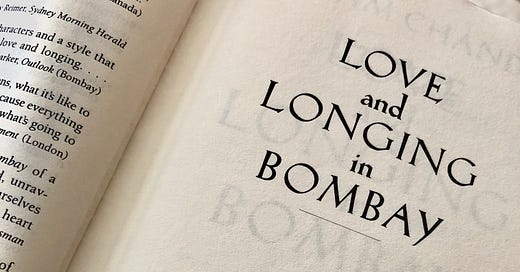3. Used Books and the Stories We Tell Ourselves

Finding gifted books in used book stores is a secret joy of mine. Their handwritten dedications provide lively feed for speculation. Was the book a birthday gift? An anniversary gift? A this-is-my-favorite-book-of-all-time-therefore-you-must-read-it gift? (The last kind is my favorite—there’s a magic in the spontaneity of being gifted a book.)
Even the temper of the gifter's scrawl evokes imagery.
What’s the appeal of speculating about this? I think it has to do with creating stories that paint unknown people in the best light. Great friends share books. When I see inscriptions, I feel like I’ve been given a glimpse into a great relationship.
I came across this inscription in a copy of Love and Longing in Bombay, a collection of short stories by Vikram Chandra.

I wonder who Krishna is, who Sonia and Rajeev are, how they know each other, and so on. There’s so much in this signature—love, relationships, notes of encouragement. If it's exciting how ten words can conjure up all this, then it's astonishing how minutiae breathe life into people we don't know.
In Love and Longing in Bombay, the first short, Dharma, is both a ghost and recreation story. The protagonist, Jago Antia, is a venerated Major General in the Indian Army. Two decades before the events in the story, Antia lost his leg to amputation. He wears a false leg and feels phantom pains. One day he resigns from the army and goes to his family home in Bombay. There, he must confront literal and figurative ghosts.
“Dharma,” of course, is a Sanskrit word encompassing religious and cultural notions of “duty,” but in the sense of the story, it is the duty that Antia has to himself. He must come to terms with having lost his leg—something he has not accepted before—to grow, to find closure:
He leaned on both their shoulders, one arm around each, for the descent down the stairs. Somehow, naked and hopping from stair to stair, he was smiling. He knew nothing had changed. He knew he was still and forever Jago Antia, that for him it was too late for anything but a kind of solitude, that he would give his body to the fire, that in the implacable hills to the north, among the rocks, he and other men and women, each with histories of their own, would find each other for life and for death. And yet he felt free. (pg. 31)
His duty is to recreate his own story in the sunset stage of his life. It’s a beautiful short.
This idea of the stories we create about ourselves is powerful. I wonder how often I lean on the stories I’ve created about myself. I am like this, or I am like that. I wonder how often I lean on the stories others have created about me. Vikram is like this, or Vikram is like that. I find that I need to check these stories regularly, to make sure that they aren’t somehow automatic, even robotic as if I’m a machine that acts based on a set of rules that have been prewritten for me.
It’s incredible how a simple book inscription—of people who I don’t know and likely will never meet—conjures all this.
Onto some other thoughts.
Seeing Ershadi, by Nicole Krauss, is a fantastic short story. I came across it in the 2019 edition of Best American Short Stories. The narrator, a ballerina, joins a dance company in Tel Aviv. She has dedicated her life to ballet, and now, to this company’s choreographer. After ballet wreaks havoc on her body, she watches a Farsi movie, Taste of Cherry, while in excruciating pain. An obsession with the film’s main character changes her life.
Seeing Ershadi is not fantasy or magical realism—it’s very much set in the modern world—yet it still lives on the edges of reality. It feels timeless, even placeless. Krauss summarizes the piece’s meaning towards the end when the narrator reflects on her life years later:
How much time we wasted, she wrote, believing that things came to us as gifts, through channels of wonder, in the form of signs, in the love of men, in the name of God, rather than seeing them for what they were: strengths that we dragged up from the nothingness of our own depths.
Krauss’s words read like water and sound like honey. I’m amazed at how she captures this idea of the stories we tell ourselves so effortlessly.
Publication news.
My story A Crack in the Ground that Went to the Other Side of the Earth was nominated for Sundress Publications’ Best of the Net award anthology. Many thanks to the wonderful editors at About Place for honoring me with this!
I read the story for About Place Journal’s Practices of Hope Reading Series, which you can watch and listen to here.
Until next time.



